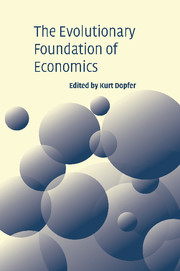Book contents
- Frontmatter
- Contents
- List of contributors
- List of figures
- List of tables
- Prolegomenon
- I Ontological foundations
- 2 The rediscovery of value and the opening of economics
- 3 Synergetics: from physics to economics
- 4 Darwinism, altruism and economics
- 5 Decomposition and growth: biological metaphors in economics from the 1880s to the 1980s
- 6 Path dependence in economic processes: implications for policy analysis in dynamical system contexts
- 7 Is there a theory of economic history?
- II A framework for evolutionary analysis
- Index of topics
- Index of names
- References
6 - Path dependence in economic processes: implications for policy analysis in dynamical system contexts
Published online by Cambridge University Press: 22 September 2009
- Frontmatter
- Contents
- List of contributors
- List of figures
- List of tables
- Prolegomenon
- I Ontological foundations
- 2 The rediscovery of value and the opening of economics
- 3 Synergetics: from physics to economics
- 4 Darwinism, altruism and economics
- 5 Decomposition and growth: biological metaphors in economics from the 1880s to the 1980s
- 6 Path dependence in economic processes: implications for policy analysis in dynamical system contexts
- 7 Is there a theory of economic history?
- II A framework for evolutionary analysis
- Index of topics
- Index of names
- References
Summary
Introduction: credo and context
I believe that the future of economics as an intellectually exciting discipline lies in its becoming an historical social science. Much of my work as an economic historian has sought to convey a strong sense of how ‘history matters’ in economic affairs by undertaking applied studies, focused on the behaviour of stochastic processes at either the micro- or the macroeconomic level, in which the proximate and eventual outcomes could be said to be path-dependent. By the term ‘path-dependent’ I mean that the process is non-ergodic: a dynamical system possessing this property cannot shake off the effects of past events, and, consequently, its asymptotic distribution (describing the limiting outcomes towards which it tends) evolves as a function of its own history.
Although path dependence will be found where a dynamic resource allocation process is not described by a first-order Markov chain, it can be encountered also in some stochastic systems where the transition probabilities are strictly state-dependent (first-order Markovian) – namely, in those systems where a multiplicity of absorbing states exists. Under such conditions, small events of a random character – especially those occurring early on the path – are likely to figure significantly in ‘selecting’ one or other among the set of stable equilibria, or ‘attractors’, for the system. Although the nature of the specific selecting events themselves may elude prediction, it does not follow that the particular equilibrium configuration – among the multiplicity that are available ex ante – remain unpredictable.
Information
- Type
- Chapter
- Information
- The Evolutionary Foundations of Economics , pp. 149 - 194Publisher: Cambridge University PressPrint publication year: 2005
References
Accessibility standard: Unknown
- 25
- Cited by
